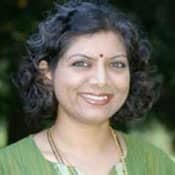Dictionary.com's definition of religion is fairly simple: "a set of beliefs concerning the cause, nature, and purpose of the universe, especially when considered as the creation of a superhuman agency or agencies, usually involving devotional and ritual observances, and often containing a moral code governing the conduct of human affairs; or a specific fundamental set of beliefs and practices generally agreed upon by a number of persons or sects: the Christian religion; the Buddhist religion." Another way of referring to a religion is by its proper name: Christianity, Buddhism, Hinduism.
The common name for the religion I adhere to is Hinduism; I am comfortable saying that I am a Hindu. But I grew up in America as "the other," and had to put a label on my belief system, one that my parents taught me to respect and value. I later learned in college in India that most people who grow up there don't ever really have to think of identifying themselves as Hindus or spell out that their religion is Hinduism; as a friend said, "it is a way of life, not a religion."
Fast-forward to today, where many people are curious about the religions of the world, and come to the temple to learn more about their neighbors of a different faith tradition. As Outreach chairperson, I often have to explain to visitors that many of us ethnic Hindus also use the term Sanatana Dharma or Hindu Dharma to refer to Hinduism. As a representative from the Hindu community on different panels—whether on behalf of the Hindu American Foundation or as part of a local interfaith educational initiative—I try to address this issue, so that people are not afraid to broach the topic of faith, religion, and spirituality with their Hindu friends. As I become more involved in advocating for a better understanding of Hinduism and for interfaith dialogue, I have discovered that there is a discomfort amongst my community about associating themselves with the terms Hindu and Hinduism.
Many scholars in the West, such as Stephen Prothero, who also encourage people to find opportunities for interfaith dialogue, don't seem to understand why Hinduism doesn't find favor as a term. But in American Veda: From Emerson and the Beatles to Yoga and Meditation, How Indian Spirituality Changed the West, author Phil Goldberg explains it beautifully. In his introduction he answers "Why not Hinduism?" Goldberg points out that Hinduism is widely misunderstood, has been subjected to centuries of distortion, and that "very few Americans of non-Indian descent call themselves Hindus . . . even if their spiritual practices derive from that tradition."
I have anecdotes galore about ethnic Hindus who say they are "spiritual, not religious," or that their faith practice is not a religion, when I approach them about Hindu American advocacy. A member of the local interfaith community asked me why some Hindus don't really appear comfortable acknowledging or explaining their religion. A lay leader from the temple I am active at challenged me to define who is a Hindu. Recently, a friend involved in the Plymouth-Canton Timebank approached me about their outreach efforts, because they hadn't made much progress with the Hindu community. These incidents all link to a common challenge; explaining Hinduism is not something most ethnic Hindus had to do while living in mostly-Hindu India. We are facing a new frontier as immigrants: identifying ourselves as and defining what it means to be Hindu-Americans.
Fortunately, there are resources out there: Newsweek's August 2009 column by Lisa Miller suggested that "We [Americans] Are All Hindus Now," and explains the monotheism (the Truth is One . . .) and pluralism (. . . the wise call it by many names) that are foundational to the Hindu faith. And Satguru Sivaya Subramuniyaswami, founder of HinduismToday.com, was comfortable with calling himself a Hindu, and started the online magazine with its beautiful and colorful print edition in 1979. A non-profit organization which I am part of, the Hindu American Foundation, seeks to educate leaders in public policy, academia, media, and the public at large about Hinduism. Many people from around the world have written tomes, trying to explain Indian spirituality or Hinduism in a Western context—from Dr. S Radhakrishnan, a scholar and first president of India, author of Eastern Religions and Western Thought to Linda Johnsen, whose The Complete Idiot's Guide to Hinduism remains a personal favorite.
Hinduism is the world's third largest religion, faith tradition, or spiritual philosophy, with a billion adherents, practitioners, or followers. As Shakespeare said, "a rose by any other name would smell as sweet . . ."—whatever phrase you choose to call it or the person whose beliefs are derived from it, it has some pretty amazing things to offer such as pluralism, yoga, and Vedanta. Maybe those who are uncomfortable with the terms "Hindu" and "Hinduism" will realize that the only way to dispel these misunderstandings and foster an awareness of its value is by accepting the terms and explaining them correctly.
8/24/2011 4:00:00 AM





